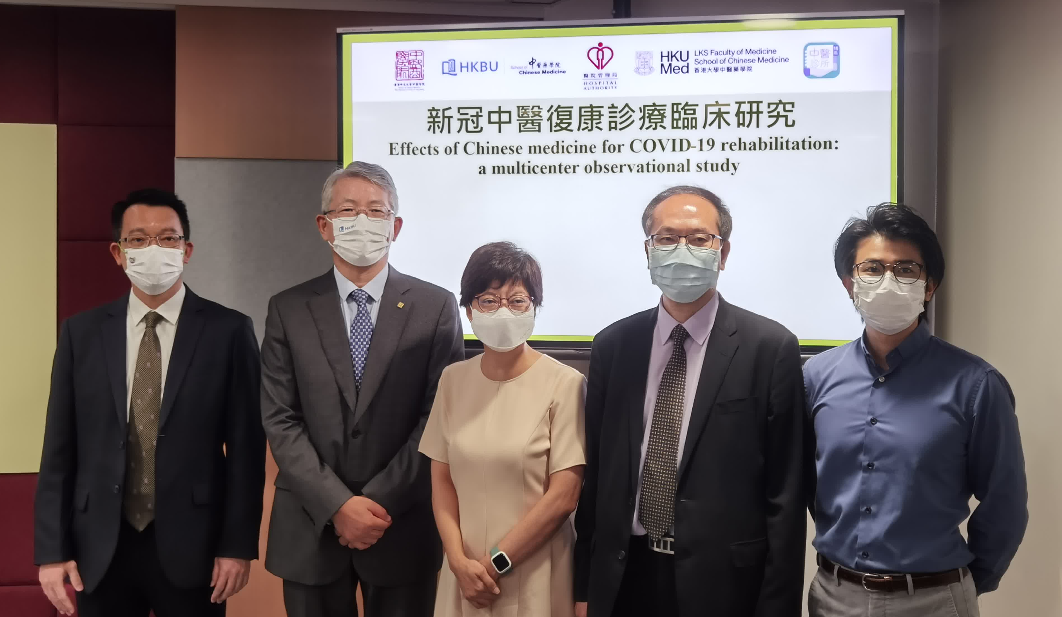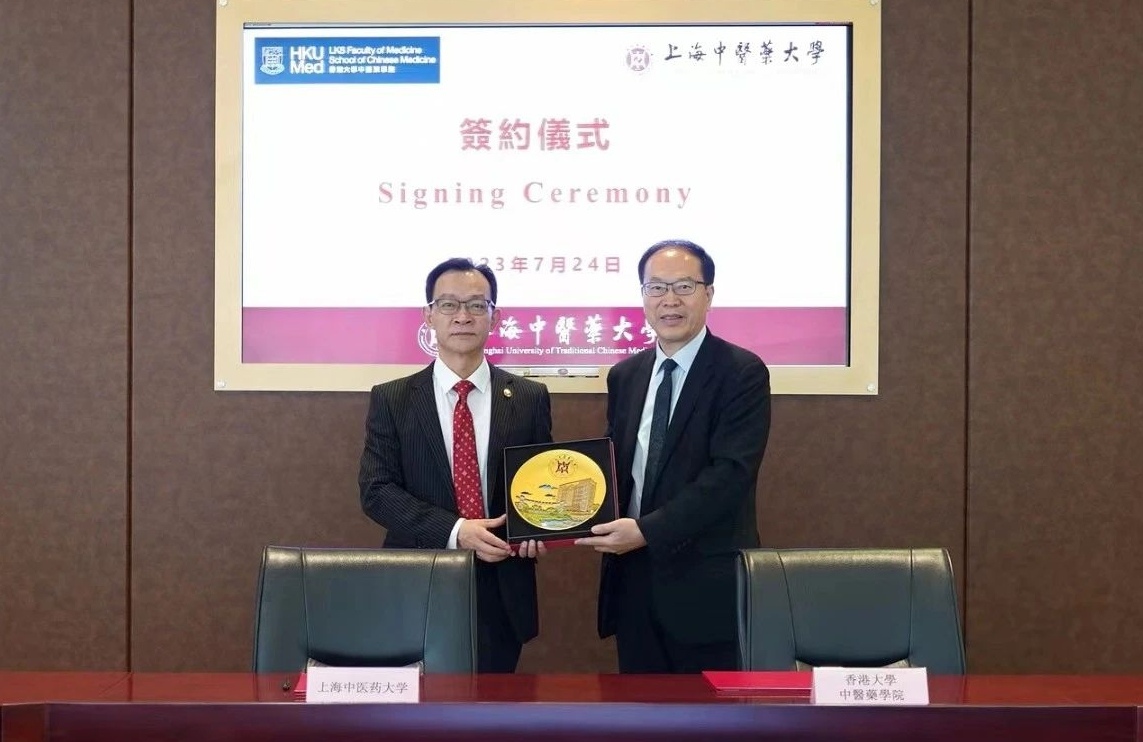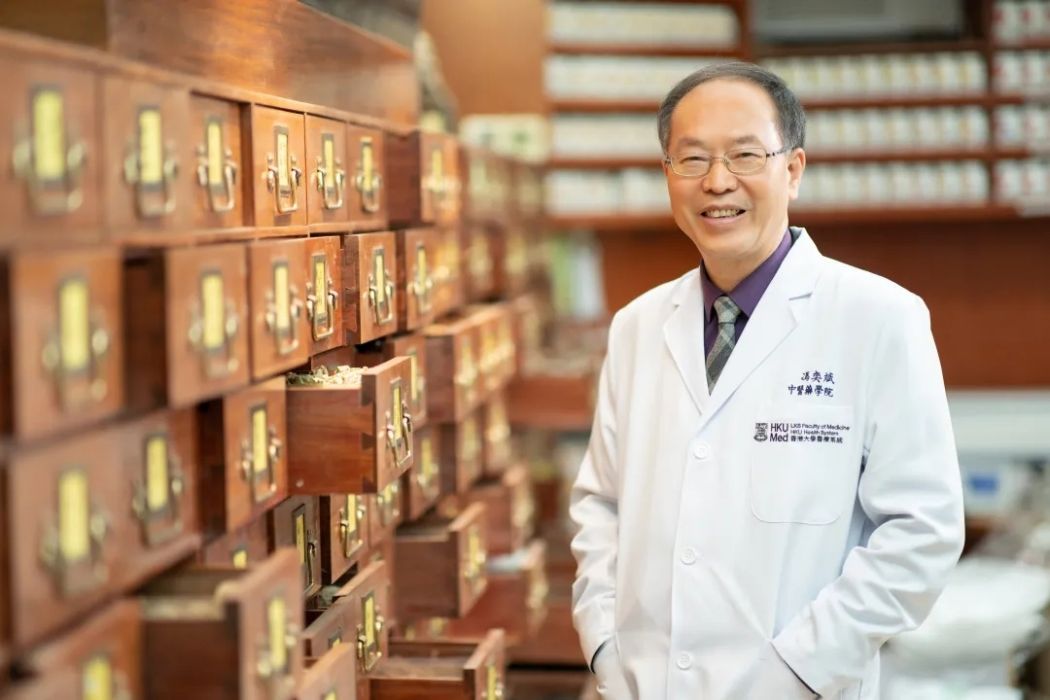馮奕斌,教授,現任香港大學中醫藥學院院長,國家藥典委第十二屆委員,註冊中藥師,香港中醫藥管理委員會委員,香港醫院管理局中藥委員會委員,香港中醫藥管理委員會中成藥註冊評審專家組專家,香港註冊中醫學會常務委員。主要從事創新技術對中醫藥進行臨床和實驗研究。
基本介紹
- 中文名:馮奕斌
- 學位/學歷:博士
- 職稱:教授
- 任職院校:香港大學中醫藥學院
專業領域,工作簡介,人物經歷,科研方向與成果,發表論文,
專業領域
中藥學,中藥藥理學和中藥毒理學;肝腎病學,代謝性疾病和腫瘤學;中醫藥教育
工作簡介
香港大學中醫藥學院教授,醫學博士,博士生導師,長期活躍在中醫藥教育、臨床和研究的第一線,主管教學,從學生招生,教材編寫,教學改革,校內外教學評估和教學研究等方面,均發揮領導和主導的作用,2020年2月6日起被任命為署理院長,2021年2月起被任命為院長,全面管理學院的教學、臨床、研究、服務和行政工作。在國內外中醫藥相關的學術領域也發揮著領導作用,如2012擔任第三屆國際藥膳食療及第三屆中國藥膳食療大會的大會執行主席,2017年香港大學龐鼎元國際中醫藥研討會主席,2013,2018和2019年擔任三屆國際現代化中醫藥學術會議聯席主席(ICMCM)。兼任香港中醫藥管理委員會委員,香港醫院管理局中藥委員會委員,香港中醫藥管理委員會中成藥註冊評審專家組專家,香港註冊中醫學會常務委員,也兼任國內多個大學或研究機構的客座教授,如湖北省楚天講座教授,湖北醫藥學院神農講座教授,中國科學院和貴州省天然化學重點實驗室教授,國內多個醫藥院校的客座教授等,作為大會基調演講,大會演講及國內外特邀講座160餘次。也曾任日本名城大學,日本北海道大學,沙特國王阿卜杜拉斌健康科學大學和美國耶魯大學的客座研究員,客座教授和訪問科學家。近年擔任60多家國際中醫藥和相關專業雜誌的編委和評審員,被列為香港大學引用率最高的頂尖1%的學者之一。

出席記者會

與上海中醫藥大學進行合作
人物經歷
2021年2月 – | 香港大學中醫藥學院院長,教授,博士生和博士後導師,香港政府註冊中醫師,中醫學碩士課程腫瘤學統籌,香港港怡醫院顧問醫生,香港大學-深圳醫院顧問醫生 |
2020年9月 - 2021年2月 | 香港大學中醫藥學院署理院長,教授,博士生和博士後導師,香港政府註冊中醫師,中醫學碩士課程腫瘤學統籌,香港港怡醫院顧問醫生,香港大學-深圳醫院顧問醫生 |
2020年2月 - 2020年9月 | 香港大學中醫藥學院署理院長,副教授,博士生和博士後導師,香港政府註冊中醫師,中醫學碩士課程腫瘤學統籌,香港港怡醫院顧問醫生,香港大學-深圳醫院顧問醫生 |
2017年10月-2017年11月 | 美國耶魯大學醫學院藥理學系訪問科學家 |
2014 - 2020 | 香港大學中醫藥學院副教授,副院長(教學),博士生和博士後導師,香港政府註冊中醫師 |
2011 - 2014 | 香港大學中醫藥學院副教授,助理院長(教學),博士生和博士後導師,香港政府註冊中醫師 |
2010 - 2011 | 香港大學中醫藥學院助理教授,助理院長(教學),博士生導師,香港政府註冊中醫師 |
2004 - 2009 | 香港大學中醫藥學院助理教授,學院全日制課程統籌主任,碩士研究生導師,博士生導師,香港政府註冊中醫師 |
2002 - 2004 | 香港大學中醫藥學院中醫助理教授,碩士研究生導師,香港政府有限度註冊中醫師 |
2000 - 2002 | 香港大學專業進修學院中醫助理教授,香港政府有限度註冊中醫師 |
1997 - 1999 | 日本札幌市北海道大學醫學院博士後研究學者 |
1991 - 1993 | 日本名古屋市名城大學藥學院藥理學訪問科學家 |
1987 - 1991 | 中國雲南中醫學院中藥教研室講師 |
1983 - 1985 | 中國雲南省德宏州人民醫院醫生 |
科研方向與成果
專業方向為藥理學,中藥藥理學,中藥毒理學和中醫內科學,尤其關注並主要從事中醫藥防治腫瘤和肝腎及糖尿病的基礎和臨床研究,也專注於所研究領域的保健品、藥物研發以及新治療方法開發套用,指導博士後3名,在讀博士生6名,均為高額獎學金獲得者。10名受訓過的博士、博士後、訪問學者或高級訪問學者回國後,均獲聘為中國內地著名大學的教授、副教授職位。
馮奕斌博士的研究興趣是中藥在惡性腫瘤,內分泌代謝性疾病和自身免疫性疾病中臨床套用規律的探討;對中藥單方,複方及其活性成分的藥理作用,作用機制和安全性進行評價。研究生涯早期曾獲中國政府,日本政府,日本北海道政府,北海道大學,日本住友社會福祉財團,日本滕澤製藥股份有限公司和日本津村漢方製藥有限公司等的獎學金和研究基金。近年獲得香港大學研究基金,香港大學教育發展研究基金,香港政府研究資助局研究基金基金,香港政府創新科技基金,香港政府衛生福利局基金,香港政府中醫藥發展基金,黃氏基金,龐鼎元中西醫教學與研究基金,大地女神基金,香港政府配套基金,香港醫院管理局中醫藥研究基金以及香港和內地企業契約研究基金等的支持,作為首席研究者,獲得超過2千3百萬港幣的研究資助,另一方面,結合香港大學多學科及國際網路優勢,作為共同研究合作者,得到2千多萬港幣的研究資助,並與英國,美國,加拿大,日本和中國內地形成了廣泛的學術合作。在多年中西醫結合和套用現代科學技術研究中醫藥的基礎上,建立了肝腎疾病、糖尿病、腫瘤及炎症等技術平台,主要套用藥理學,免疫學,細胞分子生物學,組學技術和網路藥理學等方法開展對中藥單、複方及有效成分在癌症和肝腎及糖尿病等方面的基礎和臨床研究。馮奕斌博士的研究團隊會堅持與不同學科的醫生和科學家合作,發揮中藥多成分,多靶點的特點和優勢,從科學的觀點、臨床醫學和中西醫合作的角度,開展對不同腫瘤的基礎和臨床研究,重視癌症相關疾病的研究,如代謝性疾病,從癌症患者的實際出發,辨證論治,與西醫藥優勢互補,並從中醫藥這個偉大寶藏中,為癌症患者及代謝性疾病提供中醫藥的新療法,新藥物和補充替代療法。
他的研究團隊學術上的成就,體現在保肝,保腎,降糖,抗炎,抗氧化,細胞死亡,抗腫瘤中藥的物質基礎、分子作用機制研究和相關臨床套用,瀕危中藥的替代研究,中醫藥研究方法學和中醫藥教育研究,主要集中在肝腎疾病病、癌症和糖尿病的中西醫結合研究上,在科技成果轉化研究和產業化方面,得到第二屆(2019-2020年度)中國科技產業化促進會專家提名推薦獲個人傑出貢獻獎,其研究團隊也獲科技創新二等獎。至2020年9月,總的出版物超過400,在國內外學術期刊上發表了學術論文186篇(中文31,英文150,日文5),著作超過33部,獲得或授權中國專利10項,PCT專利1項,國內外會議論文或擇要250篇(中文48,日文20,英文182),作為大會基調演講,大會演講及國內外特邀講座160餘次.馮奕斌博士作為第一作者和通信作者,影響因子超過10分的SCI論文10篇,超過5分的SCI論文30餘篇。
發表論文
- Tan HY, Wang N, Zhang C, Chan YT, Yuen MF, Feng Y*. LOXL4 Fosters an Immunosuppressive Microenvironment During Hepatocarcinogenesis. Hepatology. 2020 Oct 17. doi: 10.1002/hep.31600. Online ahead of print. (IF: 14.679, 5-year IF 14.094, Q1).
- Wang N, Tan HY, Lu Y, Chan YT, Wang D, Guo W, Xu Y, Zhang C, Chen F, Tang G, Feng Y*. PIWIL1 governs the crosstalk of cancer cell metabolism and immunosuppressive microenvironment in hepatocellular carcinoma. Signal Transduction and Targeted Therapy, 2021 Feb 26;6(1):86. doi: 10.1038/s41392-021-00485-8. (IF 13.493, Q1).
- Xu Y, Wang N, Tan HY, Li S, Zhang C, Zhang ZJ, Feng Y*. Panax notoginseng saponins modulate the gut microbiota to promote thermogenesis and beige adipocyte reconstruction via leptin-mediated AMPKα/STAT3 signaling in diet-induced obesity. Theranostics, 2020,accepted for application. (IF 8.85, 5-year IF9.01).
- Lu Y, Chan YT, Tan HY, Li S, Wang N*, Feng Y*. Epigenetic regulation in human cancer: the potential role of epi-drug in cancer therapy. Molecular Cancer. 2020 Apr 27;19(1):79. doi: 10.1186/s12943-020-01197-3. (IF: 15.320).
- Wang N, Tan HY, Li S, Wang D, Xu Y, Zhang C, Wen X, Che CM, Feng Y*. SBP2 Deficiency in Adipose Tissue Macrophages Drives Insulin Resistance in Obesity. Science Advances 2019 Aug 14; 5(8):eaav0198. doi: 10.1126/sciadv.aav0198. eCollection 2019 Aug. (IF 13.116).
- Tan HY, Wang N, Lam W, Guo W, Feng Y*, Cheng YC*. Targeting tumour microenvironment by tyrosine kinase inhibitor. Molecular Cancer. 2018 Feb 19; 17(1):43. doi: 10.1186/s12943-018-0800-6. (IF 15.320).
- Zhang C, Wang N, Tan HY, Guo W, Chen F, Zhong Z, Man K, Tsao SW, Lao LX, Feng Y*. Direct inhibition of TLR4/MyD88 pathway by geniposide suppresses HIF1α-independent VEGF expression and hepatocellular carcinoma angiogenesis. British Journal of Pharmacology 2020 Mar 6. doi: 10.1111/bph.15046. [Epub ahead of print]. (IF 7.730, Q1).
- Chen F, Zhong Z, Tan HY, Gu W, Zhang C, Cheng CS, Wang N, Ren J, Feng Y*. Suppression of lncRNA MALAT1 by betulinic acid inhibits hepatocellular carcinoma progression by targeting IAPs via miR-22-3p. Clinical and Translational Medicine, 2020 Oct;10(6):e190. doi: 10.1002/ctm2.190. (IF: 7.919, Q1).
- Li S, Wang N, Tan HY, Chueng F, Zhang ZJ, Yuen MF, Feng Y*. Modulation of Gut Microbiota Mediates Berberine-Induced Expansion of Immuno-Suppressive Cells to Against Alcoholic Liver Disease. Clinical and Translational Medicine, 2020 Aug;10(4):e112. doi: 10.1002/ctm2.112. Epub 2020 Aug 13. (IF: 7.919, Q1).
- Wang N, Zhu M, Tsao SW, Man K, Zhang ZJ, Feng Y*. MiR-23a-mediated Inhibition of topoisomerase 1 expression potentiates cell response to etoposide in human hepatocellular carcinoma. Molecular Cancer 2013 Oct 8; 12(1):119. (IF 15.320).
- Wang N, Pan W, Zhu M, Zhang M, Hao X, Liang G, Feng Y*. Fangchinoline induces autophagic cell death via p53/sestrin2/AMPK signaling in human hepatocellular carcinoma cells. British Journal of Pharmacology 2011;164(2b):731-742. (IF 7.730).
- Wang N, Tan HY, Li S, Feng Y*. Atg9b Deficiency Suppresses Autophagy and Potentiates Endoplasmic Reticulum Stress-Associated Hepatocyte Apoptosis in Hepatocarcinogenesis. Theranostics 2017 Jun 2; 7(8):2325-2338. (IF 8.85, 5-year IF9.01).
- Yang Y, Ji J, Di L, Li J, Wang LC*, Feng Y*. Resource, chemical structure and activity of natural polysaccharides against alcoholic liver damages. Carbohydrate Polymers, 2020 Aug 1;241:116355. doi: 10.1016/j.carbpol.2020.116355. Epub 2020 May 1. (IF 7.182).
- Guo W, Tan HY, Li S, Wang N, Feng Y*. Glutamic-Pyruvic Transaminase 1 Facilitates Alternative Fuels for Hepatocellular Carcinoma Growth-A Small Molecule Inhibitor, Berberine. Cancers (Basel). 2020 Jul 9;12(7): E1854. doi: 10.3390/cancers12071854. (IF 6.162, Q1).
- Tan HY, Wang N, Man K, Tsao SW, Che CM, Feng Y*. Autophagy-induced RelB/p52 activation mediates tumor associated macrophage repolarisation and suppression of hepatocellular carcinoma by natural compound baicalin. Cell Death and Disease (2015) 6, e; doi:10.1038/cddis.2015.271 (IF 5.959, 5-year IF 6.304).
- Tan HY, Ho VWT, Chan YT, Zhang C, Wang N, Xia W, Feng Y*. Combination of Gentiana rhodantha and Gerbera anandria in the BL02 formula is therapeutic in non-small cell lung cancer acting via Rap1/cdc42 Signaling: a Transcriptomics/ Bio-informatics biological validation approach. Pharmacological Research 2019 Aug 26:104415. doi: 10.1016/j.phrs.2019.104415. (IF 5.893, 5-year IF5.578)
- Tsang CM, Cheung KCP, Cheung YC, Man K, Lui VWY, Tsao SW, Feng Y*. Berberine suppresses Id-1 expression and inhibits the growth and development of lung metastases in hepatocellular carcinoma. Biochimica et Biophysica Acta (BBA)-Molecular Basis of Disease 1852 (3), 541-551. (IF 5.108, 5-year IF 5.964).
- Wang N, Zhang C, Xu Y, Li S, Tan HY, Wang D, Xia W, Feng Y*. OMICs approaches-assisted identification of macrophages-derived MIP-1γ as the therapeutic target of botanical products TNTL in diabetic retinopathy. Cell Communication and Signaling 2019 Jul 22;17(1):81. doi: 10.1186/s12964-019-0396-5. (IF 5.111, 5-year IF 4.603)
- Tan HY, Wang N, Chan YD, Zhang C, Guo W, Chen F, Zhong ZF, Li S, Feng Y*. ID1 overexpression increases gefitinib sensitivity in non-small cell lung cancer by activating RIP3/MLKL-dependent necroptosis. Cancer Letters, 2020, in press. (IF 7.360, 5-year IF 6.260).
- Klionsky DJ*,…Feng Y, …et al. Guidelines for the use and interpretation of assays for monitoring autophagy (3rd edition). Autophagy. 2016 Jan 2; 12(1):1-222. (IF 11.100, and the 5-Year IF11.815).
- Li S, Tan HY, Wang N, Zhang ZJ, Lao L, Wong CW, Feng Y*. The role of oxidative stress and antioxidants in liver diseases. International journal of molecular sciences 2015, 16 (11), 26087-26124 (IF 4.181, 5-Year IF 4.331)
- Tang J, Feng Y*, Tsao S, Wang N, Curtain R, Wang Y. Berberine andCoptidis Rhizoma as novel antineoplastic agents: A review of traditional use and biomedical investigations. Journal of Ethnopharmacology 2009, 126:5-17. (IF 3.690, 5-year IF 3.671)
- Wang N, Feng Y*, Zhu M, Tsang CM, Man K, Tong Y, Tsao SW. Berberine induces autophagic cell death and mitochondrial apoptosis in liver cancer cells: the cellular mechanism. Journal of cellular biochemistry 2010, 111(6):1426-36. (IF 3.448, 5-year IF 3.342)
- Tan HY, Wang N, Li S, Hong M, Wang X, Feng Y*. The reactive oxygen species in macrophage polarization: reflecting its dual role in progression and treatment of human diseases. Oxidative medicine and cellular longevity 2016, 16pages, https://doi.org/10.1155/2016/2795090. (IF 5.076)
- Jodo S, Kobayashi S*, Kayagaki N, Ogura N, Feng Y, Amasaki Y, Fujisaku A, Azuma M, Yagita H, Okumura K, Koike T. Serum levels of soluble Fas/APO‐1 (CD95) and its molecular structure in patients with systemic lupus erythematosus (SLE) and other autoimmune diseases. Clinical & Experimental Immunology 1997, 107:89-95. (IF 3.711, 5-year IF 3.516).
- Feng Y*, Siu K, Wang N, Ng KM, Tsao SW, Nagamatsu T, Tong Y. Bear bile: dilemma of traditional medicinal use and animal protection. Journal of Ethnobiology and Ethnomedicine 2009, 5 (1), 2. (IF 2.273, 5-year IF 3.06).
- Ye XS, Feng Y*, Tong Y, Ng KM, Tsao SW, Lau George KK, Sze CW, Zhang YB, Tang J, Shen JG, Kobayashi S. Hepatoprotective effects of Coptidis Rhizoma aqueous extract on carbon tetrachloride-induced acute liver hepatotoxicity in rats. Journal of Ethnopharmacology 2009, 124:130–136.
- Tsang CM+, Lau Echo PW+, Di K, Cheung PY, Hau PM, Ching YP, Wong YW, Cheung Annie LM, Wan Thomas SK, Tong Y, Tsao SW* and Feng Y*. Berberine inhibits RhoGTPases and cell migration at low doses but induces G2 arrest and apoptosis at high doses in human cancer cells. International Journal of Molecular Medicine 2009; 24:131-138. (IF 3.098, 5-year IF 3.107).
- Hong M, Li S, Tan HY, Wang N, Tsao SW, Feng Y*. Current status of herbal medicines in chronic liver disease therapy: the biological effects, molecular targets and future prospects. International journal of molecular sciences 16 (12), 28705-28745. (IF 4.556, 5-Year IF 4.331).
- Li S, Hong M, Tan HY, Wang N, Feng Y*. Insights into the role and interdependence of oxidative stress and inflammation in liver diseases. Oxidative medicine and cellular longevity 2016, 2016:4234061. doi: 10.1155/2016/4234061. (IF 5.076, 5-year IF 4.392).
- Feng Y*, Wang N, Ye X, Li H, Feng Y, Cheung F, Nagamatsu T. Hepatoprotective effect and its possible mechanism of Coptidis rhizoma aqueous extract on carbon tetrachloride-induced chronic liver hepatotoxicity in rats. Journal of Ethnopharmacology 2011,138: 683-90.
- Wang N, Zhu M, Wang X, Tan HY, Tsao SW, Feng Y*. Berberine-induced tumor suppressor p53 up-regulation gets involved in the regulatory network of MIR-23a in hepatocellular carcinoma. Biochim Biophys Acta (BBA) - Gene Regulatory Mechanisms. 2014 Sep; 1839(9):849-57 (IF 4.599, 5-year IF 4.932)
- Wang N, Feng Y*, Zhu M, Siu FM, Ng KM, Che CM*. A Novel Mechanism of XIAP Degradation Induced by Timosaponin AIII in Hepatocellular Carcinoma. Biochimica et Biophysica Acta (BBA) - Molecular Cell Research 2013 Jul 29;1833(12):2890-2899. 1. (IF 4.739, 5-year IF 5.281).
- Wang N, Feng Y*, Tan HY, Cheung F, Hong M, Lao L, Nagamatsu T. Inhibition of Eukaryotic Elongation Factor-2 Confers to Tumor Suppression by a Herbal Formulation Huanglian-Jiedu Decoction in Human Hepatocellular Carcinoma. Journal of Ethnopharmacology 2015, 164:309-318 (IF 3.690, 5-year IF 3.908)
- Xu Q*, Feng Y, Duez P, Hendry BM, Hylands PJ. The hunt for anti-fibrotic and pro-fibrotic botanicals. The Art and Science of Traditional Medicine Part 1: TCM Today – A Case for Integration, Science 2014;346 (6216 Suppl), S19-S20.
- Hong M, Wang N, Tan HY, Tsao SW, Feng Y*. MicroRNAs and Chinese medicinal herbs: new possibility in cancer therapy. Cancers 2015, 7 (3):1643-1657. (IF 6.162).
- Li S, Wang N, Tan HY, Hong M, Yuen MF, Li H, Feng Y*. Expansion of Granulocytic- Myeloid-derived Suppressor Cells in Response to Ethanol-Induced Acute Liver Damage. Frontiers in Immunology 2018; 9:1524. (IF 5.082, 5-year IF 5.789).
- Qu Y, Dou B, Tan HY, Feng Y*, Wang N*, Wang D*. Tumor microenvironment-driven non-cell-autonomous resistance to antineoplastic treatment. Molecular Cancer 2019 Mar 30; 18(1):69. doi: 10.1186/s12943-019-0992-4. (IF15.320).

